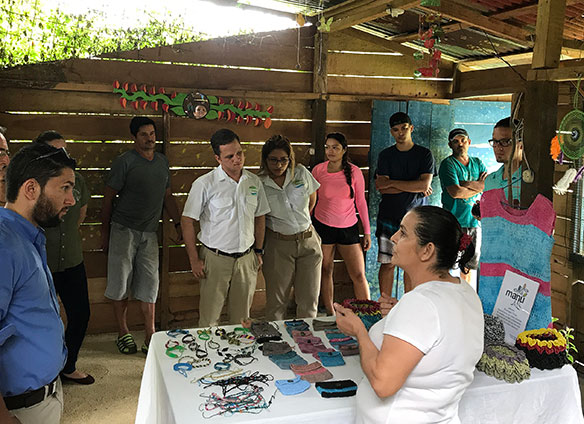
Artisans create fashion by Recycling
Crafted with care
IAN STALKER
Stephen Martinelli believes the interior Costa Rican community of El Roble de Sarapiqui is looking a little more spic and span these days thanks to a couple of local artisans.
Martinelli, working in Costa Rica with the U.S. Peace Corps, notes Ligia Ecalante and Mayela Lara are fashioning crafts for tourists out of items that might otherwise end up as litter in local streets.
Ecalante creates the likes of bracelets, necklaces, purses, tote bags, and clothes from recycled plastic bags, while Lara uses discarded plastic bottles to create carvings of the likes of keychains, chimes and fridge magnets.
Both incorporate hues in their products that represent Sarapiqui region flora and fauna.
“Their business model is targeted at selling their goods to tourists, in addition to the interactive workshop where tourists learn how to create small crafts with the recycled materials,” Martinelli reports. “They typically connect with tourists by having expositions at area tourist locations like hotels or adventure centers.”
The interactive workshop receives tourists through the Kay Rica Rural Tourism package, which Martinelli is involved with. Kay Rica features options that can include the likes of whitewater rafting, touring a sustainable farm and visiting one of Ecalante’s and Lara’s workshops.
What’s the goal?
“The end goal for each of the actors in this package is to have their own stand-alone business, while also being part of a greater rural tourism program here in the community that collectively promotes the traditional way of life and rural Costa Rican culture, says Martinelli, who is based in El Roble de Sarapiqui. “It is our goal to continually add more and more community members to this project to continue growing opportunities in this sector. I would also say that this project echoes the Peace Corps’ larger goal of creating sustainable economic opportunities through the transfer of skills and capacity building.”
About 40 to 50 plastic bags are used to produce a tote bag. Both Ecalante and Lara have set up collection areas where people drop off bags and bottles for the artisans, and Martinelli says the community has become well aware of the women’s work, and many residents drop off recyclable items at their workshops.
Martinelli – who acknowledges that support for recycling and conservation tends to be gradual – says he believes the area around El Roble de Sarapiqui has become cleaner in the 12 months that he’s been there, citing a “change in attitude toward keeping public spaces clean and a collective sense of duty and ownership that many community members have taken up.”
And he’s convinced that the type of work
that Ecalante and Lara do can be adopted elsewhere in rural Costa Rica and larger urban areas, helping a country that prides itself on its natural side be cleaner.
“Down the road, Ligia and Mayela plan to lead capacity building courses to other aspiring women artisans in Costa Rica, where they can teach their unique method and spread their entrepreneurial approach to conservation,” he reports.

